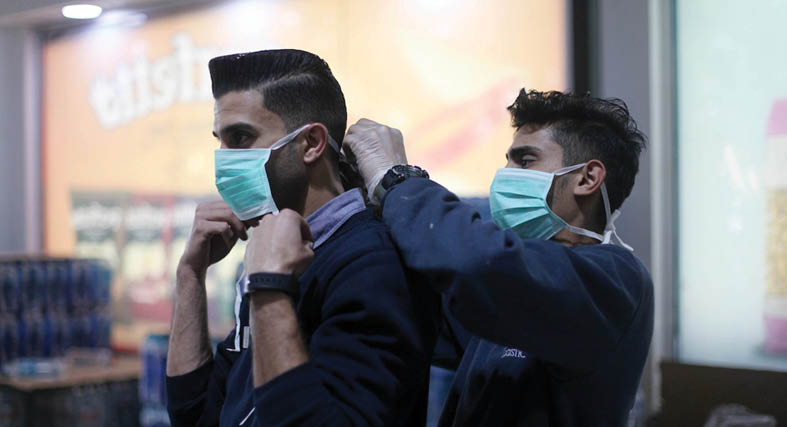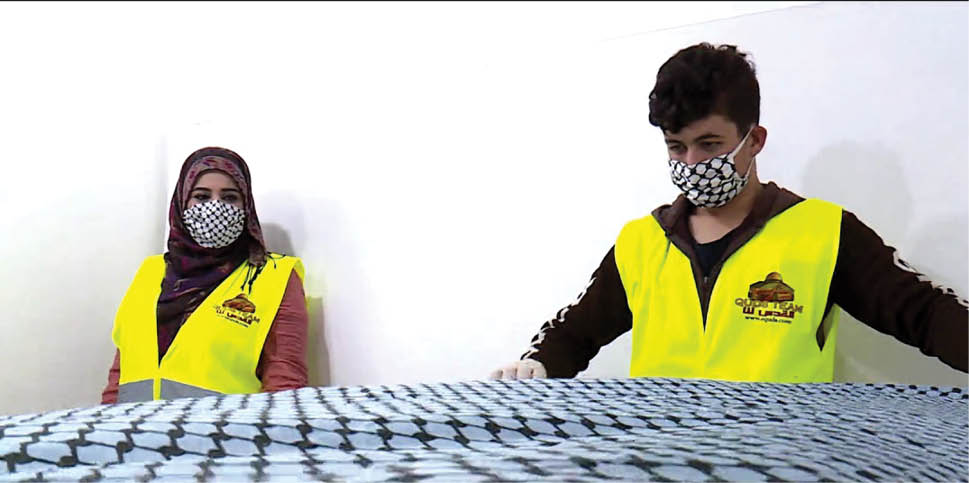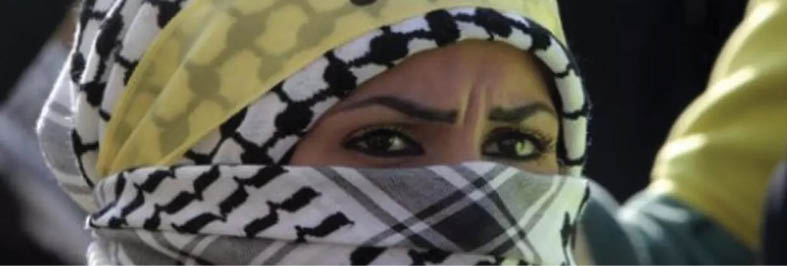As Palestine and indeed the rest of the world continue to grapple with fighting COVID-19, the conversation on returning, reconnecting, and reopening has begun, and the crucial question is: How will Palestine fight back? Youth in Palestine and the organizations that support them play an essential role in getting Palestine back on its feet and ensuring a sense of enduring support. There is, however, a pressing need for increased governmental and external support, and Palestinian youth suffer without it. Nevertheless, their stories are nothing short of inspiring and show, even in our most trying times, the power of communities and ideas coming together.
This story begins in Jerusalem. Muntaser Edkaidek, executive director of Burj Alluqluq Social Center Society, praises the incredible way its youth have come together. The Jerusalem Gathering, an association of nearly eighty medical, youth, and voluntary institutions in Jerusalem, was created to fight the coronavirus and take real steps to show solidarity with the city’s people. The gathering received requests to volunteer from hundreds of young men and women who live in the city of Jerusalem, each wanting to contribute according to her/his specialty and place of residence. This initiative then created a hub on social media that spread awareness and provided psychological, medical, and preventative counseling. The youth were able to utilize their social media skills, as a large number of social media designers and specialists gave their time to unify the media discourse and awareness in the city and fight rumors about the virus.

The young people’s use of social media in educating others about the virus has resulted in media campaigns that aim to shed light on the importance of social distancing, hygiene kits, and taking the necessary precautionary measures when leaving the house. Another aim was to help others who were struggling, says 24-year-old Tareq Al-Hendi of his volunteering at the Social Development Forum. For him, going forward was more about adapting to the situation than finding a cure, incorporating the required protection measures into a daily routine until a vaccine is discovered. He brought up the role of young medical teams that lack the physical abilities to face a crisis of any type, as they lack ICUs and breathing devices. This reveals the worrying truth that even with the aid of the most competent Palestinian doctors to combat a virus such as coronavirus, it could potentially be devastating if widespread, due to the lack of medical equipment and hospitals, which is the case particularly in Gaza.
The power of unity echoes through the Social Development Centre, a youth organization in New Askar Refugee Camp, Nablus, the first of its kind in the area. In one of the most densely populated West Bank camps (with 7,000 people living in an area of one square kilometer), life in New Askar was not easy before the coronavirus pandemic hit. Residents live under poor shelters in cramped living conditions and face widespread unemployment. Nevertheless, people like Amjad Rfaie, the director of the center, have been and continue to be relentless in their initiatives and support that have provided significant help to young people. Under “normal” conditions, the camp has a variety of services and amenities from dabke groups and summer camps to language courses. But what really makes New Askar Camp stand out is the support its young people provide to those who come to the dedicated center for people with disabilities. Amjad explains, “This is especially the case during this volatile time because the virus is very dangerous for people with disabilities. We are partners with other NGOs who offer them online training and art competitions. We give them supplies to make drawings and paintings. But most importantly, we offer psychological support to help them deal with the virus situation. Our staff makes home visits to help people feel less alone, letting them know that they are part of and supported by our society.”
Palestinian youth need their government behind them in order to become all that they can be.
Amjad shared that the youth were facing tough times, being quarantined. But the center has found ways to keep them busy and productive through initiatives and campaigns that educate people on hygiene and on ways to protect themselves from the virus. Most impressively, they initiated a campaign to support approximately 600 families in the camp, who were struggling financially, by raising money to buy food for them. Amjad also inspired the camp’s youth to keep the camp clean and ensure that the older people had access to medical checkups. A video shows members of the youth camp preparing hundreds of food packages, and Amjad explains: “Tomorrow night, we will give these food packages to the families, and they will be very happy. Thank you very much to everyone who made donations. The people here need your help.” He then introduces a man in his thirties who is deaf and unable to speak. He stops arranging the food packages and turns to the camera, gesturing to his heart so as to say thank you. He gives a thumbs-up and then lovingly pats Amjad on the back before continuing his work. It’s hard not to be humbled by this coming together to help others. Here, the youth are instrumental in the efforts to support the most vulnerable around them, repaying a center that has given them so much.

All the people I spoke to at various youth centers said that they rely heavily on the support of donors, and the withdrawal of their support could be disastrous for the thousands of young people who depend on them. Such devastation, in turn, would affect what youth can contribute to Palestinian society, whether that be fighting the coronavirus or other challenges.
Within minutes of speaking to the people behind the youth organizations, it becomes clear that Palestine’s future is perceived to be in the hands of the young men and women who have the power and the will to change it.
Not so far away, near Ramallah, the youth of Al-Am’ari Camp are doing what they can for their country as well. Like New Askar Camp, Al-Am’ari Camp is densely populated. Ahmad Tomaleh runs the camp that is considered a youth camp because approximately 80 percent of its population is under 40. As expected, the youth have been affected by the economic impact of the virus that has increased the unemployment and poverty rates in the camp. To document the role of youth in this pandemic, Ahmad showed dozens of photos of young boys and men from the camp in protective gear, disinfecting the streets and preparing food with their masks on. “Young people have played a big role in fighting disease, as they have formed emergency committees to protect and sterilize the camp,” Ahmad explained. He clearly has faith in the power of the work of Al-Amari youth, as he insisted, “With the mission taken on by the youth, we will overcome the disease, God willing. Our great hope is to defeat the disease with the help of the camp’s young people and friends.”
“For people to be convinced that it’s okay to stay at home, they need to know that they’ll have financial support and assurances that the future will be better. But if there’s no support from the government and no one who gives any assurance to those who live on the margins of poverty, it’s going to be tough.”
Anas Sarabta
The efforts of young people and youth organizations in helping Palestine recover may be commendable, but it’s not enough, even when they receive donations. Every organization and individual I spoke to stressed both the threat that the virus posed and their need for ongoing and increased economic support for a society where most live day to day and government support is lacking. Ahmad admitted, “It’s very important for life to return to normal because hunger has increased in the camp, and if the pandemic continues, it will have a devastating effect. There will be an even greater need to provide economic support to fight hunger.”
Ahmad Hawash is 26 years old and runs the Holy Land Riding Center in Jericho. He feels as though the situation is hopeless. “The situation here is horrible. I haven’t given any lessons since February, but the horses need feed every day, and I must pay rent for the land. If I weren’t from a successful family, I would’ve had to send my horses out into the street a long time ago. I have 30 horses whose upkeep requires a huge amount of money for food, medication, and horseshoes every month. My family has paid for this since February. And even though since February I haven’t been able to pay any of the employees, they decided to stay and work with me, agreeing to get paid later, when the situation improves.” Although keeping his business afloat is challenging during these times, Ahmad says that some good has come from the virus. “Our generation is finally changing because of the coronavirus. Schools and universities are going online, and online retail of clothes to food stores is spreading.” Yet, he is fully aware that without the support of his family and the loyalty of his employees his situation would be very different.
Palestinian youth are united in their belief that they have the power to make a difference – small or big – in their present circumstances and in the future. And they do.
Economic difficulties and financial crises as a result of the pandemic will occur in many parts of the world. In a nation such as Palestine, where youth face more obstacles than in most other places, everything is more difficult, however, and support is needed more than ever. Anas Sarabta, 33 years old, coordinates the Hebron Youth Development Resource Centre. And he is enthusiastic about supporting and encouraging the city’s youth. Anas describes the focus of the center on youth empowerment, stressing the importance of economics, as youth are seeking jobs and financial stability.
Since the outbreak of the coronavirus, Anas has taken impressive steps to ensure that the youth who depend on the center continue to feel this support, which is even more important because the government has shut down all institutions and organizations in Palestine. “Because my background and passion are in technology, we were one of the first organizations to make the transition to virtual training and virtual work, using technology and appropriate tools that fit our needs.” Anas made sure that the donors continued to support the center throughout the coronavirus lockdown, managing to convince them that their work could continue online. “We didn’t have to pause or cancel anything and continued our work with the same number of participants, achieving an even higher than usual level of quality.”
As a young man himself, Anas and his personal approach help the center stay connected to the youth it serves. “I am close to the youth and understand what they are going through.” He has maintained transparency about his own struggles during the lockdown and has enabled dialogue, ensuring that the youth feel free to talk about the difficulties they face, including dealing with life at home. “A number of initiatives focused on making things easier. Many people were trying to support freelancing and transitions to online work. Our initiative aimed to help people relax and have a somewhat positive experience at home. I held many sessions where I talked about my personal challenges and successes, how I work at home and deal with my wife and my daughter while working with my team. I talked about strategies that can help us focus and make sure that we spend quality time at home.”

Such psychological support seems to be working for the youth whom Anas mentors. Saad Ghanem, a 29-year-old English teacher who also runs a leather goods business, explained, “At the beginning, when coronavirus first came to Palestine, I tried to think about what I could do. I have lots of debts, having gotten married only a month before the lockdown. So I advertised on Facebook and managed to get many customers who were interested in my work, buying wallets, belts, and bags. This has helped.” Because the general situation limits Saad’s online business to Palestine, he came up with an initiative to both help Palestine combat the virus and support himself financially by selling masks made from leather. “I hope to be useful. A lot of people were interested in my work and the way I designed this mask because they can change the filter in order to use it many times, not just once. I am considering producing larger quantities.”
Saad believes that the lack of governmental support prevents many youth from having the opportunities they need to grow. “Young entrepreneurs need government support to establish themselves. They could then become independent and able to help their families.” Saad supports the charity works of the community through, for example, food donations to the Ibrahimi Mosque. “No one is hungry in Hebron. They call it a city where no poor person goes to sleep hungry.” But all he wants for himself is to see his business grow so that “I can give to those in need.”
The Waslt Khair youth team was created by a group of students who believe that “each of us has a national, social responsibility towards our country, our people, and our society. We believe that we can make a change.” They engage in social media campaigns and simple charity work by buying clothes and making food parcels. If anything can be learned from what youth are doing in Palestine, it is that they are doing all they can do. There is a sense of love for and duty to Palestine and to one another. If nothing more, the role of youth in getting Palestine back on its feet can be summed up by the words of a member of Waslt Khair, “Teams and youth groups give a glimpse of the concept of unity. Palestine is our land and our home. All our efforts are focused on keeping it strong.” We must, at the very least, wonder how much further the innovations, ideas, and efforts of Palestinian youth would go with adequate external support, if this is how far they go without it.


